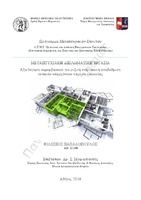Αξιολόγηση παρεμβάσεων για ριζική ενεργειακή αναβάθμιση τυπικών υπαρχόντων κτιρίων κατοικίας

Θεματική επικεφαλίδα
Περιβαλλοντική μηχανική ; Environmental engineering ; Ενεργειακή ανάπτυξη -- Περιβαλλοντικές απόψεις ; Energy development -- Environmental aspects ; Κατοικίες ; HousingΠερίληψη
Η παρούσα εργασία με τίτλο «Αξιολόγηση παρεμβάσεων για ριζική ενεργειακή αναβάθμιση τυπικών υπαρχόντων κτιρίων κατοικίας» πραγματεύεται τη παρουσίαση και σύγκριση των σύγχρονων τεχνολογιών και μεθοδολογιών ενεργειακής αναβάθμισης υπαρχόντων κτιρίων κατοικίας. Σκοπός της εργασίας είναι η διερεύνηση της δυνατότητας ριζικής ενεργειακής αναβάθμισης υφιστάμενων κατοικιών και η συγκριτική αξιολόγηση των εφαρμοζόμενων πακέτων παρεμβάσεων με βάση δύο κριτήρια: την οικονομική αποδοτικότητα και την περιβαλλοντική επίδοση. Με άλλα λόγια, συνεκτιμώνται αυτές οι δύο βασικές διαστάσεις στη θεωρητική λήψη απόφασης για τα εναλλακτικά σενάρια ενεργειακών παρεμβάσεων που παρουσιάζονται στις περιπτώσεις μελέτης (case studies) στο πειραματικό μέρος της έρευνας. Αναλυτικότερα, η εργασία χωρίζεται σε δύο μέρη · το θεωρητικό και το πειραματικό. Στο πρώτο μέρος, διατυπώνεται ο προβληματισμός και η ανάγκη για τη συγκεκριμένη έρευνα, καθώς και ο σκοπός της εργασίας. Γίνεται μια συνοπτική βιβλιογραφική ανασκόπηση - ιστορική αναδρομή, όπου καταγράφονται οι κυριότερες πολιτικές και νομοθετικές παρεμβάσεις της Ευρωπαϊκής Ένωσης σχετικά με το περιβάλλον, τόσο στη περίοδο μέχρι το 2020 (στόχος 20-20¬20) όσο και μακροπρόθεσμα μέχρι το 2050 (roadmap 2050). Επίσης γίνεται αναφορά στην ελληνική νομοθεσία και πολιτική για το περιβάλλον και πώς αυτή εντάσσεται στο κτιριακό τομέα. Αναλύεται επίσης η μεθοδολογία της έρευνας καθώς και ο τρόπος λειτουργίας του λογισμικού ΤΕΕ ΚΕΝΑΚ που χρησιμοποιήθηκε στο πειραματικό μέρος για τους υπολογισμούς. Επιπλέον, γίνεται μια εκτενής επισκόπηση των διαθέσιμων τεχνολογιών που σχετίζονται με παρεμβάσεις ενεργειακής αναβάθμισης στον οικιστικό τομέα, τόσο στα ενεργειακά συστήματα όσο και στο κέλυφος του κτιρίου, ενώ παρουσιάζονται ορισμένες βασικές αρχές οικονομικής αξιολόγησης επενδύσεων, που χρησιμοποιήθηκαν στην παρούσα ανάλυση. Στο πειραματικό μέρος της εργασίας, με την εφαρμογή του λογισμικού ΚΕΝΑΚ του ΤΕΕ γίνεται αξιολόγηση της παρούσας κατάστασης τριών υφιστάμενων κατοικιών και εκδίδεται το αντίστοιχο Πιστοποιητικό Ενεργειακής Απόδοσης (ΠΕΑ). Μετά την ενεργειακή κατάταξη του κάθε κτιρίου μελέτης, προτείνονται κατά περίπτωση επεμβάσεις αναβάθμισης που χωρίζονται σε δύο εναλλακτικά σενάρια, τα οποία διαφοροποιούνται ως προς την επιλογή συστήματος θέρμανσης. Στα σενάρια αυτά, αποσκοπούμε να εκτιμήσουμε κατ' αρχάς τις συνολικές δυνατότητες μείωσης της ενεργειακής κατανάλωσης και αναβάθμισης της ενεργειακής κατάταξης του υπάρχοντος κτιρίου, και κατά δεύτερον την οικονομική αξιολόγηση των επεμβάσεων με βάση το αρχικό κόστος επένδυσης και τη μείωση του λειτουργικού κόστους, υπολογίζοντας τελικά τον απλοποιημένο χρόνο απόσβεσης της επένδυσης. Επιπροσθέτως, πραγματοποιείται αξιολόγηση των δύο σεναρίων με βάση τη σύγκριση νέας κατάστασης - υπάρχουσας κατάστασης. Τέλος, επιλέγεται ένα σενάριο εκ των δύο, απατώντας στο ερώτημα της θεωρητικής λήψης απόφασης συνεκτιμώντας το οικονομικό και το περιβαλλοντικό όφελος. Το κύριο συμπέρασμα που προκύπτει από την έρευνα είναι ότι το ελληνικό κτιριακό απόθεμα είναι χαμηλής ενεργειακής απόδοσης, και δεδομένου της σημερινής οικονομικής κατάστασης, το ενδιαφέρον του κατασκευαστικού τομέα είναι λογικό να στραφεί στον εκσυγχρονισμό των υπαρχόντων κατοικιών. Τα αποτελέσματα της μελέτης καταδεικνύουν ότι οι υφιστάμενες κατοικίες στη χώρα είναι ενεργειακά σπάταλες και παρουσιάζουν πολύ μεγάλα περιθώρια μείωσης των ενεργειακών απαιτήσεων. Συγκεκριμένα, η διερεύνηση σεναρίων ριζικής ενεργειακής αναβάθμισης στις 3 κατοικίες που εξετάσθηκαν στο πλαίσιο της παρούσας εργασίας έδειξε ότι από τεχνολογικής σκοπιάς είναι εφικτή η μείωση των ενεργειακών καταναλώσεων κατά 70-80%. Μια τέτοια αναβάθμιση του κτιριακού αποθέματος απαιτεί επενδύσεις της τάξης των 130Ευρώ ανά m2. Αντίστοιχα οι χρόνοι αποπληρωμής που υπολογίσθηκαν είναι της τάξης των 11 -12 ετών. Τέλος, με βάση τα αποτελέσματα της έρευνας τα πακέτα επεμβάσεων με την μεγαλύτερη μείωση των ενεργειακών δαπανών των κτιρίων δεν οδηγούν αναγκαστικά και στη καλύτερη ενεργειακή και περιβαλλοντική επίδοση.


